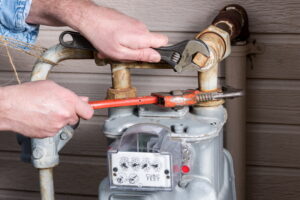Natural gas is a great fuel to use for home heating. It’s affordable and efficient, it’s a domestic product and does not rely on foreign oil, and in most places it can be piped directly into your home so you don’t have to worry about bothersome deliveries. Many homes use natural gas not just for heating but for their stove, water heater, or even clothes dryer.
Natural gas makes some people nervous because of health and safety concerns. It’s actually perfectly safe if handled correctly, and according to the Energy Information Administration, it’s used in 61% of American homes. It is critical to ensure that your gas line and appliances are operating safely. Do you need a gas line inspection? Here’s what you should know.
Age
The gas line that connects your home to your local natural gas provider might last up to fifty years in ideal conditions. However, conditions are almost never ideal. Moisture, for example, can cause gas lines to corrode.
If your gas was connected twenty or more years ago, or if you don’t know how long the lines have been there, it’s time for an inspection. As the lines get older, annual inspections may be recommended.
Legal Obligations
If you are a landlord, you have legal responsibilities toward your tenants that you don’t have regarding your own home. You must have your property’s gas safety checked every year to renew your gas safety certificate. As this is to ensure tenant safety, you might consider doing it for your own home as well, since it is the best practice for staying safe.
Specific Concerns
Any issues you notice with your gas line or gas appliances should be addressed immediately. Don’t put off getting a gas line inspection in Johns Creek, GA if you have the slightest suspicion that something might be wrong. It could save your life! Here are the signs to watch out for.
- Odors: Natural gas is odorless, so mercaptan is added. This chemical smells like sulfur or rotten eggs.
- Damage: If you see kinks or dents in your gas line, or your home has been hit by storm debris or affected by a construction mishap or any other risk of damage, err on the side of caution.
- Usage: A gas leak can cause your utility bill to skyrocket.
- Appliance Issues: A gas stove, for example, may have decreased fuel at the burners and show smaller flames. The oven may take longer to preheat.
- Hissing: In some cases, homeowners can hear the hiss of gas escaping from a damaged line.
- Pilot Problems: Get prompt help if your pilot light is any color other than blue.
- Dead Houseplants: A gas leak is dangerous to any living things. Your plants might react first.
- Sick Pets: Because of their size and higher metabolism, pets often suffer from carbon monoxide poisoning before people experience serious symptoms. Listlessness, gagging, vomiting, failure to eat, or other unusual behavior can indicate a gas leak.
- Sick People: Shortness of breath, loss of balance, nausea, and problems with vision and memory are all signs of carbon monoxide poisoning.
When in doubt, don’t hesitate! Get a gas line inspection right away.
To speak with a member of our team, contact DC Cheek Heating, Cooling & Plumbing today. Fixed, At the Speed of Life!




